If you wake up regularly with a sore jaw and headaches, or you’ve noticed tiny fractures in your teeth, you may be grinding your teeth — and you’re not alone.
Many people grind their teeth at night and many may not be aware they are doing it, according to American Dental Association. In fact, the malady, in medical parlance, is called bruxism and usually takes diagnosis by a dentist to identify it.
ADA spokeswoman Maria Lopez Howell, who is also a dentist, told the Associated Press in an interview that many times people have no idea they grind their teeth at night.
“A lot of times someone else tells them,” she said. “We will have patients who come in and say ‘Oh my wife grinds her teeth,’ or a parent saying ‘my child is really grinding’ so someone who listens to them while sleeping will report that.”
And teeth grinding doesn’t just happen at night. Here’s a look at how you can manage teeth grinding and prevent further damage:
Teeth grinding can be caused by a number of things, including: anxiety, stress, exhaustion or signs of a sleeping disorder, like an apnea, according to Howell.
The ADA stresses that people who are grinding their teeth should see a dentist to get to the bottom of why they are grinding and determine if it’s a sign of something more serious like sleep apnea.
“It’s important to talk to your dentist about if you have any sleep disorders, because you don’t want to miss an opportunity to see whether you need something other than a night guard,” Howell said.
And it’s not just anxiety and stress that can cause grinding.
A recent study from Journal of the American Dental Association (JADA) found that some behaviors, including overuse of alcohol, caffeine and tobacco may increase the risk of teeth grinding.
Drinking alcohol and smoking tobacco were both found to more than double the odds of teeth grinding, while heavy caffeine drinking increased the odds by one and a half, according to the review of seven studies ranging in size from 51 to more than 10,000 people.
What are the Symptoms?
People grind their teeth during the day, at night or both. The ADA listed several symptoms that may indicate teeth grinding, including waking up with a dull headache, sore jaw, sensitive teeth, or even notice fractures in their teeth. While some may brush off teeth grinding as no big deal, going untreated can cause a problem later.
Howell said many people don’t recognize that the jaw’s temporomandibular joint is just that — a joint — and, like any other joint, it can suffer from a systematic disease like arthritis.
“The teeth are part of the mouth, but the whole chewing complex is part of a joint and that joint can get arthritis just like the hip, knee or any other joints. I think people really discount or just don’t realize that,” she said.
How can I treat teeth grinding?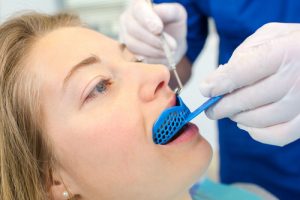
While there are a slew of options from over-the-counter plastic molds to companies that will send you casts for your mouth, The ADA recommends that people consult their dentist to find out the cause of their grinding and get a customized treatment plan.
“Bruxism needs to be teated by a doctor, a mouthguard is something that provides protecting against blows in sports for instance, but bruxism is a condition that needs to be treated by a dentist with a night guard or splint,” she said. “This actually involves the joint; we are protecting the joint and the teeth, and it needs to be done with experience and knowledge of that whole chewing complex.”
 There are various heart conditions that require special precautions when it comes to caring for teeth and the mouth. Chronic and acute conditions, including a cardiac event (heart attack), high blood pressure, angina, stroke or congestive heart failure, should be discussed with the dentist or your physician prior to any dental procedures.
There are various heart conditions that require special precautions when it comes to caring for teeth and the mouth. Chronic and acute conditions, including a cardiac event (heart attack), high blood pressure, angina, stroke or congestive heart failure, should be discussed with the dentist or your physician prior to any dental procedures. It’s no secret that certain foods don’t do your breath any favors. Dr. Meyers has several suggestions for how to reduce stinky oral-related dilemmas, starting with limiting foods that are associated with less than pleasant scents.
It’s no secret that certain foods don’t do your breath any favors. Dr. Meyers has several suggestions for how to reduce stinky oral-related dilemmas, starting with limiting foods that are associated with less than pleasant scents.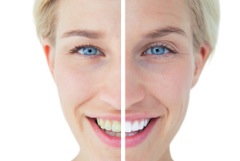 No one wants to have yellow teeth but the methods that we often use to whiten them can be invasive to some patients. The most common ingredient in dental office bleaching sessions is hydrogen peroxide and the most common ingredient in at-home whitening treatment kits is carbamide peroxide. Some who undergo whitening treatments with these chemicals have reported increased sensitivity, so we are suggesting some alternative ways to keep your pearly whites white. Here are six suggestions that may surprise you:
No one wants to have yellow teeth but the methods that we often use to whiten them can be invasive to some patients. The most common ingredient in dental office bleaching sessions is hydrogen peroxide and the most common ingredient in at-home whitening treatment kits is carbamide peroxide. Some who undergo whitening treatments with these chemicals have reported increased sensitivity, so we are suggesting some alternative ways to keep your pearly whites white. Here are six suggestions that may surprise you: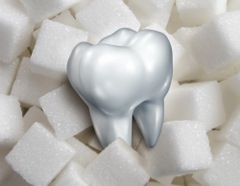 Some people may not associate their smile with a healthy life, but the mouth is the gateway to the body and having a healthy mouth is the start to having a healthy body.
Some people may not associate their smile with a healthy life, but the mouth is the gateway to the body and having a healthy mouth is the start to having a healthy body.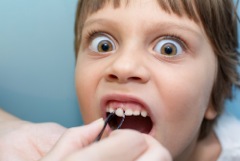 Managing a patient’s actual or perceived pain is difficult enough, but pediatric pain management takes that difficulty to a whole new level. In truth, there’s very little a hygienist does during a pediatric cleaning that causes actual pain. Sure, there may be an occasional pinched lip, accidental pressure put on a loose tooth or even a slip with a scaler. (The most commonly uncomfortable thing asked of young patients is asking them to close on a bitewing tab for x-rays.)
Managing a patient’s actual or perceived pain is difficult enough, but pediatric pain management takes that difficulty to a whole new level. In truth, there’s very little a hygienist does during a pediatric cleaning that causes actual pain. Sure, there may be an occasional pinched lip, accidental pressure put on a loose tooth or even a slip with a scaler. (The most commonly uncomfortable thing asked of young patients is asking them to close on a bitewing tab for x-rays.) News out of Melbourne, Australia this month that a team of scientists at the University of Melbourne’s Oral Health CRC has been working on a vaccine treatment for chronic periodontitis could herald a breakthrough in the gum disease, with clinical trials beginning in 2018.
News out of Melbourne, Australia this month that a team of scientists at the University of Melbourne’s Oral Health CRC has been working on a vaccine treatment for chronic periodontitis could herald a breakthrough in the gum disease, with clinical trials beginning in 2018.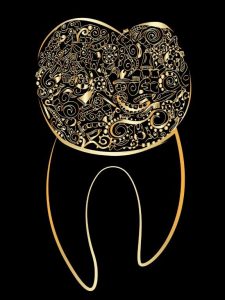 While unlikely, it is possible for a crown to come unstuck (“debond”), especially if it’s knocked or if you happen to bite into something hard or very sticky. Not surprisingly, it can be both unsettling and worrisome. Worse yet, what do you do if you’re unable to see your dentist for a day or two, or possibly longer, depending on the circumstance?
While unlikely, it is possible for a crown to come unstuck (“debond”), especially if it’s knocked or if you happen to bite into something hard or very sticky. Not surprisingly, it can be both unsettling and worrisome. Worse yet, what do you do if you’re unable to see your dentist for a day or two, or possibly longer, depending on the circumstance? We tell our children not to eat too much sugar, because sugary snacks and drinks can cause cavities. This information is true, of course, but we should be reminding ourselves as adults that the relationship between overdoing our sugar intake and our oral health is even more complex than we might admit. It turns out that the relationship between periodontitis (“inflammation around the tooth,” a serious gum infection that damages the soft tissue and bone that supports the tooth) and diabetes is a strong one indeed.
We tell our children not to eat too much sugar, because sugary snacks and drinks can cause cavities. This information is true, of course, but we should be reminding ourselves as adults that the relationship between overdoing our sugar intake and our oral health is even more complex than we might admit. It turns out that the relationship between periodontitis (“inflammation around the tooth,” a serious gum infection that damages the soft tissue and bone that supports the tooth) and diabetes is a strong one indeed.